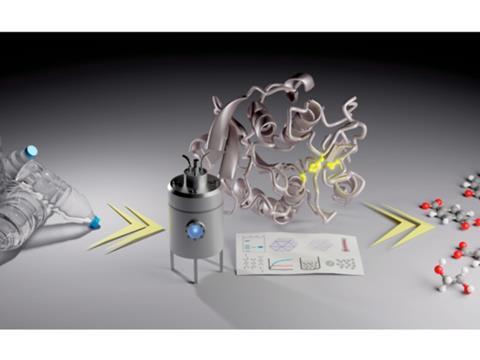
Carbios’ enzyme for degrading PET has been reported as the best-performing under industrial conditions in a new scientific publication, and it is set to be used for depolymerization in the ‘world’s first’ bio-recycling plant due for commissioning in 2025.
Scientific journal ACS Catalysis has published an article titled ‘Assessment of Four Engineered PET Degrading Enzymes Considering Large-Scale Industrial Applications’. It compares two variants of the IsPETase enzyme produced by Ideonella sakaiensis from the University of Manchester and the University of Texas at Austin; a variant of PES-H1, also known as PHL7, from the University of Greifswald; and Carbios’ LCCICCG enzyme – claiming that the latter outperforms all its competitors.
Reportedly, Carbios and Toulouse Biotechnology Institute have used a standardized method to compare PET degrading enzymes under industrial conditions and concluded that LCCICCG offers ‘superior performance’. Its capabilities have apparently been optimized since its original publication in Nature in 2020, and although its newest results have not yet been published, the enzyme is projected for use in its upcoming bio-recycling plant.
“With this publication in the prestigious ACS Catalysis journal, we wanted to offer the scientific community a standardized method for comparing enzymes under industrial conditions,” said Alain Marty, chief scientific officer at Carbios. “This study confirms Carbios’ position as a leader not only for the superior performance of its enzyme for the degradation of PET, but above all in its industrial-scale application for the biorecycling of plastic and textiles.
“I would like to thank all my teams and my fellow co-authors for their collaboration and perseverance in publishing this landmark article.”
Enzymologists Professor Uwe Bornscheuer from the University of Greifswald and Professor Gert Weber from Helmholtz-Zentrum Berlin are credited as collaborators in Carbios’ pursuit of biological recycling for PET. Carbios has also proposed an international standardized method for enzyme comparison, a move that it believes to establish its position as ‘the world leader of enzymatic PET depolymerization’.
Back in 2021, Carbios opened an industrial demonstration plant as part of the commercialisation of its C-ZYME enzymatic recycling technology. Soon after, it collaborated with Indorama Ventures to plan for a manufacturing plant at the latter’s PET production site in France.
Scientists from Leipzig University also discovered an enzyme thought to degrade PET in record time, and project leader Dr Christian Sonnendecker talked Packaging Europe through this development.
If you liked this article, you might also enjoy:
The L’Oréal approach to packaging sustainability
What steps is Apple taking to make its packaging more sustainable?
How did Brazil achieve its 100% aluminium can recycling rate – and can it be replicated in the EU?
Experts have their say on the EU’s Packaging and Packaging Waste Directive revisions














No comments yet